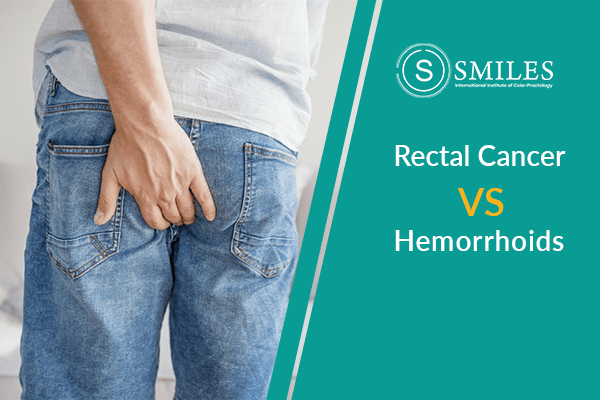About 90 percent of rectal cancer patients initially believe that they had piles or hemorrhoids due to the symptoms such as rectal itching and bleeding. Therefore, the belief that you have hemorrhoids could be the symptoms of rectal cancer.
However, if you are experiencing increased bleeding from the rectum or pain in the rectal or abdominal area, no matter what your age, you should consult a doctor immediately says Dr. Parameshwara C M, the best colorectal surgeon.
Although hemorrhoids and rectal cancer are very two different conditions, they share some similar symptoms. SMILES Institute of Gastroenterology here helps you learn about the facts and the common symptoms of hemorrhoids and rectal cancer.
Rectal Cancer Symptoms vs. Hemorrhoids Symptoms - Quick Comparison
Rectal bleeding (Bleeding from the rectum) is the most common sign or symptoms of both hemorrhoids and rectal cancer share. The other shared symptoms include blood mixed with stool, change in bowel habits, a frequent feeling of bowel movement, and discomfort or pain while passing stools.
Rectal cancer can also have symptoms of unexplained weight loss, bowel obstruction, anemia, and fatigue. These particular symptoms are not usually seen with piles or hemorrhoids. Generally, Hemorrhoids produce the symptom of itching in the rectal or anal area while rectal cancers do not.
According to the experts of coloproctology, rectal cancer (also termed as colorectal cancer) is a disease in which cancer cells form in the tissue of the rectum. Hemorrhoids, on the other hand, are blood vessels that have become swollen due to increased abdominal pressure and also due to constipation or diarrhea. Many hemorrhoids can be diagnosed during physical examination whereas rectal cancers are diagnosed by biopsy.
Any situation that increases abdominal pressure (for example, prolonged sitting and straining during bowel movements, low fiber diet, and pregnancy) is a risk factor for developing both internal and external hemorrhoids. In contrast, an increase in age, smoking, a family history of cancer and gastrointestinal diseases are the risk factors of developing rectal cancer.
Fortunately, patients with hemorrhoids have a normal life expectancy, but rectal cancer patients, especially in stage III and IV, have lower survival rates. However, several colorectal cancer treatments have been shown to increase life expectancy explains SMILES chief.
Rectal Cancer Treatment
Rectal cancer often requires more than one treatment type, an approach known as multimodal therapy. Generally, the treatment modalities used in rectal cancer are as same as modalities used in treating many other types of cancer. They are:
- ● Surgery: The standard surgical procedure used to remove cancerous tumors that lie close to the anus is abdominoperineal resection (APR). Following an APR procedure, the anus with cancer is removed, and the cut end of the large bowel is attached to the abdominal wall to form a colostomy.
- ● Chemotherapy: It is usually a combination of multiple drugs (5-Fluorouracil, Xeloda, and Eloxatin, etc)that target cancerous polyps. In people with colorectal cancer, chemotherapy is often used with radiation therapy either before or after surgery.
- ● Radiation therapy: Radiation therapy, most often refers to external beam radiation therapy is a type of cancer treatment that uses a high-powered beam to kill cancer cells. This therapy often uses X-rays but protons or other types of energy can also be used to shrink tumors.
Hemorrhoids Treatment
Piles or Hemorrhoids are a common condition among adults that cause pain and discomfort if left untreated. Although hemorrhoids often go away in a couple of weeks, many of the treatment options involve easing the symptoms of hemorrhoids until they clear up on their own.
The top coloproctologists in Bangalore suggest that the pain and itching caused due to hemorrhoids can be treated easily at home by following the below methods.
- ● Sitz baths: Sitting in a tub of warm water three times a day for 15 to 20 minutes helps ease the swelling and reduce inflammation caused by external hemorrhoids.
- ● Dietary changes: Drinking more fluids, high-fiber diet (roughage) and lessening the pressure on the rectum and anus during bowel movements, minimizes the swelling, discomfort, and bleeding caused by Piles / Hemorrhoids.
- ● Exercise: Patients with hemorrhoids should not sit for longer periods of time. Exercise is the most important part of relieving constipation and decreasing the pressure of the hemorrhoidal veins. It is crucial to have a bowel movement as soon as possible after the urge arises.
Still, there is blood in the stool or the symptoms are persistent even after trying the above home remedies? Do not ignore it. It may be a sign of serious anorectal disorders to be considered. Consult the coloproctologists at SMILES Bengaluru for the better treatment of hemorrhoids and prevent colorectal cancers.

